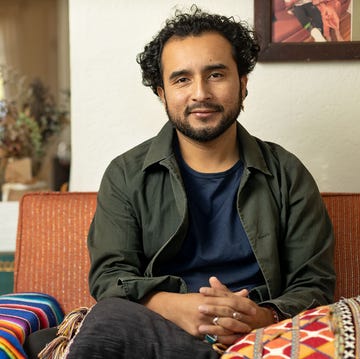Daniel A. Olivas served as the California Book Club host for the moving, brutally honest discussion of Luis J. Rodriguez’s Always Running, the July CBC selection. He kicked off the evening by placing the memoir into the broader context of Rodriguez’s large body of work and asked Rodriguez to talk about the creation of the book and the “blood, sweat, and tears” that went into his career.
Rodriguez commented that as his memoir recounts, he was homeless for about three years as a teenager—on the streets, on heroin, and stealing. He said, “I was in a gang, and I would be living in the street or any—all kinds of places. I never stayed in the same place twice.” His saving grace was the hours he spent with books in the Los Angeles Central Library. He explained, “I was homeless, but on the other hand, I was in a home with books. The books were powerful. They never put me down. They never said I would never amount to anything. They never knocked me around....In those days, there were no Rodriguezes or Martínezes or anybody there on those bookshelves. But I had a little vision of my name on the spine of one of those books.” He carried the story of Always Running with him for 20 years before writing it down.
Olivas commented that there is also magic to the purpose behind the book’s dedication to Rodriguez’s son Ramiro. Rodriguez explained that he’d gotten out of gang life early and had mentors who were Chicano activists. They’d helped him in many ways, especially since there were no recovery programs in the barrio. He said he was “cared out of that life by individuals that stood up with me.”
His son’s birth also saved him. He explained, “You don’t just get addicted to drugs. You get addicted to a whole ecosystem.” But the day he held his son, he was 20 years old, and he could never imagine going back to la vida loca. While he kept that promise, by the time Ramiro came to him at age 15, he was troubled. Gangs were everywhere, and though Rodriguez had tried to help his son, Ramiro joined a gang. Rodriguez explained, “Now I had to think about, He saved me. How am I going to save him?”
Special guest Rubén Martínez entered the conversation. He noted that during the time period recounted in Always Running, society didn’t know much about transgenerational trauma in clinical terms. He commented that the book is “about transgenerational… a transmission of wounds across time. At the same time, it’s also a transmission of a healing energy.” He remarked that Rodriguez also “crystallizes” the metaphor of “always running” in a poem in his collection The Concrete River. The poem uses the river as its central metaphor and talks about a terrible night that ultimately drove Rodriguez to break away from the violence and find solace in the Los Angeles River.
Rodriguez responded that the madness of the crazy life calls you back even after you leave it. After he’d decided not to be a cholo or a gangster street kid anymore, he still had a rage disorder and issues that he had to address, including with his first wife, as he recounted in his second memoir. The poem rose out of a terrible night in his marriage when the “devil’s breath” was on him, which was the trauma he'd experienced as a youth. The next morning, he woke up understanding he was going to hurt someone and took all energy to the L.A. River and put it into running. He also connects his running to his maternal Tarahumara roots. Tarahumara people are known as some of the best runners; they are also called “fleet-footed people.” While some Chicanos are not sure about their Indigenous roots, his mother had made sure he knew about this part of his ancestry. Martínez noted that it was beautiful that Rodriguez could find connections across generations, not only in the violence, but also in the healing, where, as Martínez put it, “Running is the flow of the river of history.”
After Olivas turned the discussion over to audience questions, Martínez returned and commented on the uptick of crime in L.A. While it’s not anywhere near what it was in the ’90s, a number of recent homicides in Los Angeles have been gang-related. He asked Rodriguez where, from a transgenerational perspective, he thinks we are now with violence, crime, and youth, whether we’re “on the edge of a cliff or…have the tools to pull it back before it gets out of control.”
Rodriguez responded that many people are working for barrio peace and gang intervention. He said there should be a Homeboy Industries (a gang-rehabilitation and reentry program) in every neighborhood. He took an effective gang-intervention plan that was created in L.A. to Guatemala, Honduras, and El Salvador, but he found there was no political will for such a program in those countries—or the U.S. In Rodriguez’s view, the plan failed to gain traction because his efforts weren’t about destroying gangs but changing them.
Rodriguez said, “Crime is rising because we failed to bring in—again—that ecosystem of caring, that ecosystem of really giving young people tools, resources. Not about us saving them but giving them the tools and the connections they may need to save themselves.”•
We hope you enjoyed this event. Please join us on August 18 at 5 p.m. when Rabih Alameddine will appear in conversation with CBC host John Freeman and special guest Aleksandar Hemon to discuss The Wrong End of the Telescope. Be sure to visit the Alta Clubhouse to let us and your fellow California Book Club members know what you think of the novel. Register here.











